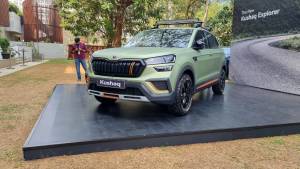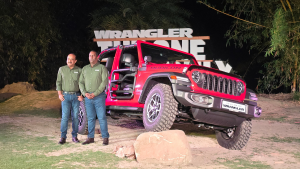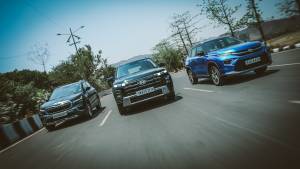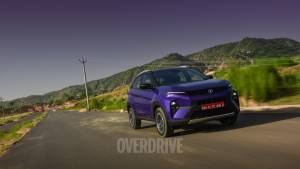Interview: Skoda Auto CEO Bernhard Maier on the Volkswagen MQB A0 platform being the base of India 2.0
Global CEO of Skoda Auto Bernhard Maier speaks to OVERDRIVE about the Skoda 2.0 initiative for India, their future platform, and heavy localisation that will bring the cost of ownership down for customers. Skoda and the Volkswagen Group are betting big on the MQB A0 platform and the mid-sized SUVs that it will produce locally while maintaining the level of quality that it is known for. Maier also says that Skoda is prepared for the Indian government's electrification target provided the Indian market is ready for it.
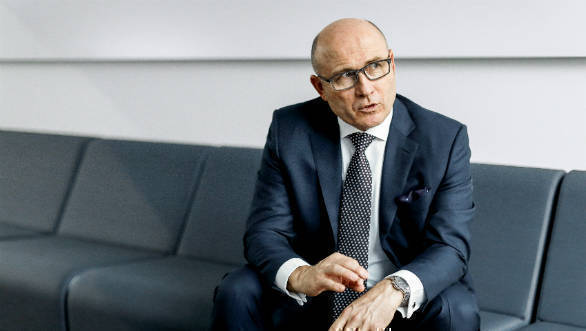 Skoda Auto global CEO Bernhard Maier
Skoda Auto global CEO Bernhard Maier
What is India 2.0? What are the changes to be expected?
Skoda has been in the Indian market for more than 17 years. So far, we have been playing not that decisive a role. We are seen as a well-established high-value brand in India, but we see a lot more opportunities in this market. These will be covered by the India 2.0 initiative.
Areas of investment and focus.
We have decided together with the (VW) group that we will start this approach with the two brands in the very dynamic segment of the mid-sized SUVs. We had discussed one and a half years ago as to whether we should partner one of the big competitors here in India, but then the authorities decided to change the requirements - BS VI comes into place from 2020 and this is a completely new story. And this is why we said we have a very well established platform already, probably the most competitive platform in the world in the MQB A0 of the Volkswagen Group. It is already coping with all these requirements of the Indian market. Now, we have mulled for a couple of months to bring down the costs so we are able to launch a car which is competitive on the one hand, but also reliable and the most high-end quality product in the market, on the other.
Amount of investment in the Indian market.
We have decided to invest 1 billion euros (Rs 7,993.54 crore approximately) in the next two and a half years beginning now.
Will the investment be in manufacturing or in the R&D space as well?
Our R&D project space is already under construction, and will be based in Pune. We are also in the process of hiring people for that. It should be operational in the course of this year.
What and how many products pipeline based on the MQB platform by 2021-22?
We already have a very attractive model line-up. We have the flagship Superb, the core of our brand - Octavia, the Rapid, and we have already started our big SUV campaign in India with the Kodiaq, which is very well received. We see the SUV segment as the most dynamic one in this market. Experts predict that this segment will grow by more than 75 per cent in the years to come. This is why we are coming with a mid-sized SUV 2020 onwards.
European and American manufacturers in the country have not been able to crack low-cost manufacturing for the price-sensitive Indian market - something the Koreans and the Japanese seem to have mastered. Hence their market share in India. How have you looked at that challenge when it comes to launching the MQB A0 platform in India?
To bring the high-end quality and at the same time at a low-cost material base is something contradictory in itself. So, we don't want to be the cheapest offering in the market, we want to be the best offering on the market. One approach which will bring us into a competitive situation is we are going to localise more than 90 per cent of all components and parts here in India. And this makes a huge difference.
Until this point in time, a lot of Skoda products were knocked down units and were assembled in India...
But not all is localised.
Going ahead, will you improve on the localisation in the manufacture of newer cars for the Indian market?
We will do both. We will have the so-called CBU cars which are built mainly in the Czech Republic and then are brought to Aurangabad. These cars will still be available in the market in the future. In addition to that, we will have the Indianised cars from Skoda and Volkswagen from 2020 onwards.
India as a strong export hub.
This is also an opportunity we are looking at. We are already doing it these days. Volkswagen is exporting a large number of cars into foreign markets. This is something that seems very interesting for Skoda as well. We will decide on-year as to how much of the production capacity is to be exported, but most of all, we want to build cars in India for Indian customers.
Export markets under consideration.
While we haven't decided yet, one of the markets in the future could be the Middle East. Also, South America is really interesting from an Indian producer point of view. There are number of opportunities, but we will decide when we reach that point.
Outlook for the Indian car market, and your thoughts on the hatchback segment which is still popular despite growth in SUVs.
Last year in India, we sold 3.2 million cars. Experts predict this will be able to grow to 5 to 6 million cars in the future, making it the third biggest car market of the world. Of course, we want to take advantage of this growth opportunity. And the market will have to change tremendously for this, which is happening now.
India is focussing a lot on alternative energy sources including electric. What is Skoda's plan? Are you also investing in alternative fuel and technology in the country?
Of course, we are. This is part of the paradigm shift we are all recognising these days. Skoda is prepared for that. We do have CNG options on offer on a worldwide scale, and we are now starting with the electrification of our entire lineup. Next year, we will bring a plug-in hybrid of the Superb. Very soon after that, a fully-electric car will be on the market by the end of 2019. By the end of 2020, we will have five electrified models in our lineup, which will go up to 10 by 2025. We are on the way, we mean business, and we are prepared for this if the market is prepared for it too. This is something that the Indian market has to prove.
Does the 1 billion euro investment include electrification efforts as well?
No, not yet. This will be over and above the investment.
Skoda is seen as a premium and niche brand in India, which is a positive in one way. But, in another, there is an apprehension regarding costs of the product as well as sales and service. How do you challenge those beliefs once you get into the SUV market, which quite price-sensitive, especially in the face of old and new competition?
One thing which is really important is to be customer-centric. This is the guiding principle for everything we do. And here we do have to invest and we will. Skoda is seen as offering among the best customer service. The total cost of ownership is also important, especially in India. And with the localisation of all parts and components, we will be able to offer much better customer service than we have been able to in the past.
Does this announcement take away the scope for a future Indian partnership which Skoda was planning?
When the market is changing and transforming this tremendously, we have to be open to partnerships in the future. Only recently the VW Group announced a partnership with the Ford Motor Company. If there is a good potential partner in the Indian market, which can also benefit from the tie-up then we would be open for that.
16. Why did the partnership with Tata Motors not work out?
The biggest difference was that officials changed the policies in terms of requirements for the entire car industry. For example, the BS VI norms. As we already had a platform that is absolutely able to cope with that already, it made more sense that we build on our own platform for cost-sensitivity.

